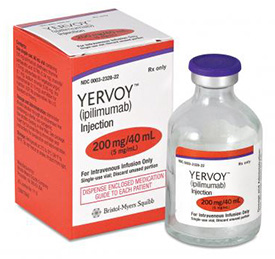Yervoy (Ipilimumab)
November 21st, 2013
 In the late 1990s, while serving as the Director of the UC Berkeley Cancer Research Laboratory, Jim became intrigued by a special biological molecule called CTLA-4. This molecule was displayed on the surface of particular cells in the immune system called T cells. Jim and his colleagues — most notably, graduate student Max Krummel, and postdoctoral fellow Cynthia Chambers — we able to provide evidence that CTLA-4 actually served to inhibit the activity of T cells. Since T cells were known to be critical for orchestrating immune attack, Jim and his colleagues hypothesized that perhaps one reason why T cells are not able to attack tumors is because they are being inhibited by CTLA-4. In a landmark paper published in 1996 in the journal Science, Jim Allison, Max Krummel, and another postdoctoral fellow in the lab Dana Leach, showed that injection of mice with an antibody to CTLA-4 could actually inhibit or eliminate tumor growth in the mice. Anti-CTLA4 has now been commercialized as an FDA-approved drug called Yervoy (Ipilimumab) for the treatment of melanoma.
In the late 1990s, while serving as the Director of the UC Berkeley Cancer Research Laboratory, Jim became intrigued by a special biological molecule called CTLA-4. This molecule was displayed on the surface of particular cells in the immune system called T cells. Jim and his colleagues — most notably, graduate student Max Krummel, and postdoctoral fellow Cynthia Chambers — we able to provide evidence that CTLA-4 actually served to inhibit the activity of T cells. Since T cells were known to be critical for orchestrating immune attack, Jim and his colleagues hypothesized that perhaps one reason why T cells are not able to attack tumors is because they are being inhibited by CTLA-4. In a landmark paper published in 1996 in the journal Science, Jim Allison, Max Krummel, and another postdoctoral fellow in the lab Dana Leach, showed that injection of mice with an antibody to CTLA-4 could actually inhibit or eliminate tumor growth in the mice. Anti-CTLA4 has now been commercialized as an FDA-approved drug called Yervoy (Ipilimumab) for the treatment of melanoma.

